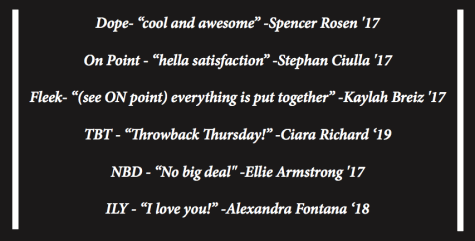Use of internet slang sneaks into students’ classrooms
R u busy rn? Nah? Then hbu #read this article about the use of internet slang. Today, the way students communicate with each other online and through text messaging is sneaking into their everyday spoken language.
According to Nick Cimarusti from USC’s student newspaper, The Daily Trojan “internet slang has invaded spoken language probably since the dawn of AOL instant messenger.” However, the use of #hashtags and abbreviations has only just reached its peak in the everyday English language. To what extent is it acceptable to use internet slang in spoken conversation?
Today, it is not uncommon to hear an Urban student say “LOL” (pronounced L-A-W-L) or “j chillin” (to express a state of “just chilling.”) Phrases such as “right now” and “just kidding” have disappeared from some high schoolers’ vocabulary, as they can now use the abbreviated versions, “rn” and “jk” instead. If you listen closely, you might even hear someone say “hashtag” prior to an adjective in spoken conversation during break.
However, at Urban, the rising use of abbreviated words and hashtags go beyond the hallways. Both students and teachers have noticed the increasing use of internet slang in the classroom.
When asked if she has ever heard someone use an abbreviated word while speaking in class, Rose Bendekgey(‘19) said “Yeah, definitely.”
Sam Masto (‘17) agrees with Bendekgey, yet he often “doesn’t even recognize [the use of internet slang in class]” because it is so common.
Urban science teacher, Matt Medeiros, has not only noticed students abbreviate words while speaking, but has also seen internet slang come into play in writing. “I’ve seen some students abbreviate things like…the letter ‘u’ for ‘you’ and people using more lowercase letters. [I’ve seen] the number ‘4’ for ‘for’ … [it’s] mostly just texting shorthand.”
Perhaps the common use of internet slang in a classroom environment at Urban yields from the causality and laid-back vibe of the school. Latté Hutchinson (‘18) noticed that whenever students use internet slang during class, her “teachers are fine with it.” Hutchinson continued, saying that, “Urban lets us be ourselves.”
Maya Berkeley (‘17) feels the same way. Though Berkeley has never herself used internet slang during class, she said she would “feel comfortable doing so because of Urban’s loose environment.”
Yet, the question of whether or not using internet slang in the classroom is appropriate still remains unanswered. Medeiros adds, “Teachers talk about this [the use of internet slang in the classroom] and debate whether this is a good or bad thing.” However,“as long as we can understand each other,” he said, “at some level I think it is ok.”
Language is constantly changing. Informal language is becoming more and more common in today’s society, especially among teenagers. The use of acronyms and hashtags has become a part of the everyday English language, and students using it is unavoidable. For now, G2G and hopefully this article is #trending.











